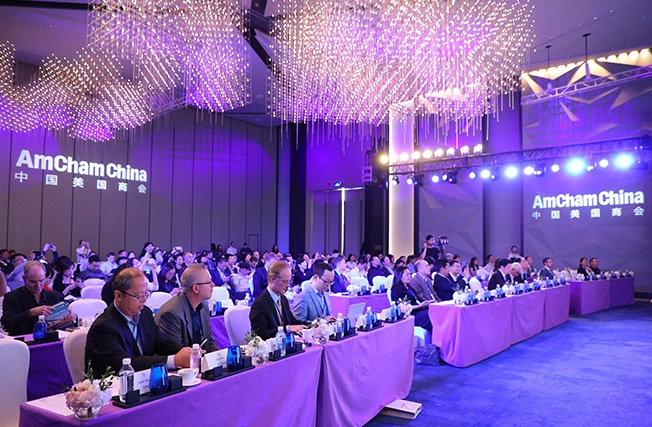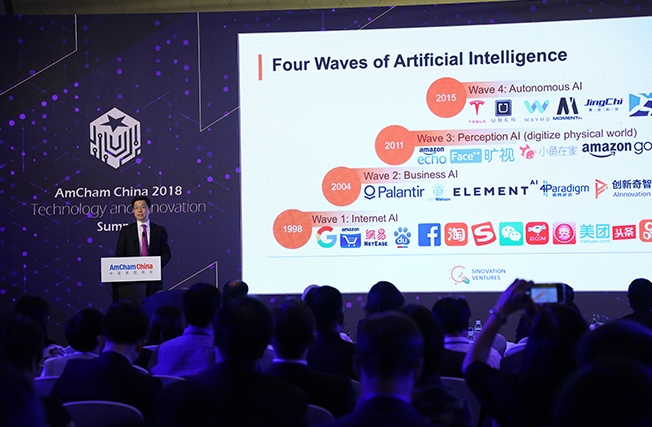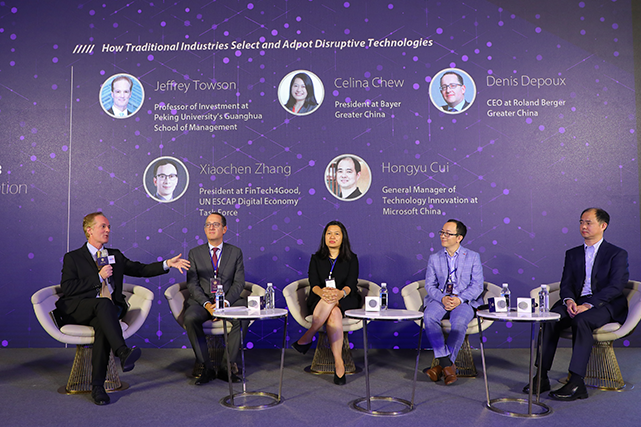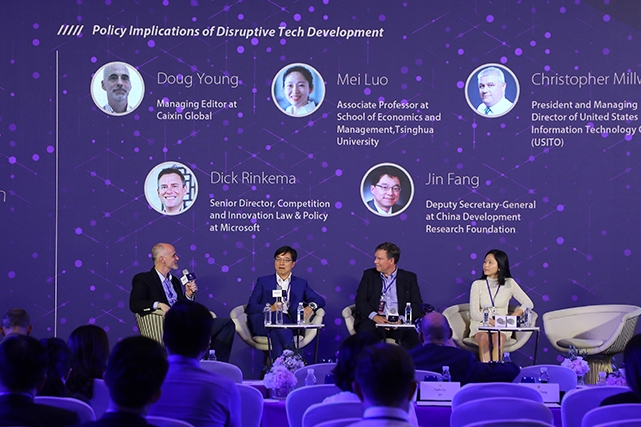
At the 2018 Tech and Innovation Summit, nearly 200 executives from multinational companies, technology startups, and nonprofit organizations converged at the inaugural AmCham China Technology and Innovation Summit (T&I Summit) at the InterContinental Hotel Sanlitun to discuss the opportunities and challenges of corporate transformation in the digital era, and the best practices of applying disruptive technologies – Artificial Intelligence (AI), blockchain, Internet of Things (IoT), etc. – into varied industries and functions.
Throughout this full-day conference, over 30 speakers shared their insights on global technology development trends, US-China collaboration, traditional industries' digital transformation strategies, the reshaping of corporate functions with emerging technologies, and the cooperation between large corporates, startups, and research institutions. In the current climate and ever-changing global economic environment, the Summit set a positive tone in seeking common interests and win-win collaboration among multinational companies, while encouraging mutual understanding and active communication in all business sectors and at all levels, especially in developing and adopting disruptive technologies and innovative business models. This inaugural event laid a solid foundation for AmCham China's endeavor to serve members in relevant technological arenas.
Kai-fu Lee Keynote on Artificial Intelligence

In his keynote speech, "The Era of Artificial Intelligence", Kai-Fu Lee, Founder and CEO of Sinovation Ventures, introduced the Four Waves of AI: Internet AI, Business AI, Perception AI (digitized physical world), and Autonomous AI. While AI is becoming a toolbox and a new platform similar to the Internet, Lee explained that there are:
5 Prerequisites for the Development of AI
- Massive Amounts of Data
- Accurate and Objective Tagging
- Singular Domains
- Sufficient Computational Power
- Top AI Scientists
In regard to these prerequisites, though Silicon Valley has historically dominated the innovative world, the "Chinese Miracle" that has taken place over the last 10 years is shaping up to disrupt the existing hierarchy, according to Lee.
"China's market size and the large amount of capital infusion, plus very tenacious entrepreneurs, have created brilliant companies like Alibaba and Tencent that continue to build more products to attract even more people online. And this loop continues with a very techno-utilitarian policy from the government to encourage that development," said Lee.
C-suite Dialogue | Adopting Digital Technologies in China: Opportunities and Challenges

In addition to AI, cloud computing, 5G, and blockchain were also considered with massive potential by expert speakers in the 2018 T&I Summit's following panel, "C-Suite Dialogue on Prospects and Challenges in the Development and Adoption of Digital Technologies in China".
Xu Mingqiang, CTO of Microsoft Greater China Region, believed people's attitudes towards AI and cloud computing are at two extremes in terms of quick adoption and bringing concrete benefits to industries. Cloud computing has always been underestimated, whereas AI is probably overestimated – at least as far as current capabilities are concerned, said Xu.
Huang Ying, Vice President of Lenovo Group, compared the development of cloud in the US and China, and noted that China has experienced a late-mover advantage in adopting these technologies since Chinese companies, unlike their American counterparts, do not have huge legacy investments or mature and rigid IT infrastructure already in place. Huang also highlighted that 5G systems, as an important infrastructure for the future development of cloud, commercial Internet of Things (IoT), smart manufacturing, and autonomous driving, will have a more holistic impact on our society. "There is a saying that 4G is changing our personal life, and 5G is going to change our society."
Jerry Cristoforo, Executive Vice President and CTO of State Street Corporation, explained that cryptocurrencies are only one aspect of blockchain technology. The more important aspect is distributed computing or distributed ledger systems, where more advancements have been made with greater resulting impact, such as in blockchain's ability to manage the identities of customers, and track changes in millions of transactions.
Ramesh Moosa, PwC Cybersecurity & Cyber Forensics leader for China and Hong Kong, expressed that China's new Cybersecurity Law (CSL) imposes very stringent enforcement on both multinational and large local companies, and is probably the most complex and rigorous cybersecurity law in the world. At the Summit, Moosa introduced the idea of the 3E Concept for CSL compliance: education (understand the law and its impact), executive support (IT staff can't deal with it all by themselves), and effect transformation into the business (take measures to ensure compliance).
Traditional Industries, Unconventional Innovations

In the panel, "How Traditional Industries Select and Adopt Disruptive Technologies", Celina Chew, President of the Bayer Group in Greater China; Denis Depoux, CEO of Roland Berger Greater China; Zhang Xiaochen, President of Fintech4Good; and Cui Hongyu, General Manager of Technology and Innovation at Microsoft China, shared their strategy and insights on the disruptive changes that emerging technologies are brining into their industries.
Celina Chew, President of the Bayer Group in Greater China noted that one of the most important technologies and innovations in the next two years for healthcare and for Bayer will be AI and smart wearables, which can eliminate the distance between doctors and patients, and reduce the costs of scientific experience and laboratory discoveries.
Zhang Xiaochen, President of Fintech4Good further put that in the financial sector, blockchain and other fintech developments will have a drastic impact, transforming society from a centralized one into a decentralized one, and improving financial inclusiveness for the lower class.
Denis Depoux, CEO of Roland Berger Greater China discussed what he believes to be the most important concept for the energy sector moving into the future, the 3Ds and 1F: decarbonization, decentralization, and digitalization in energy production and storage, and frugality in social mindset (consume less rather than consume more), are the key factors in energy revolution.
The 4 Greatest Challenges to Industries Adopting New Tech
- Seeing It Coming: Disruptions do not always come from the competitors or other players in the industry. Sometimes a technological breakthrough disruptive to your own sector or business model comes from an unrelated source.
- Mindset and Cultural Change in the Organization: When current profits are still substantial under existing business models, regular KPIs are already stressful for staff, or there are many internal bureaucratic struggles to convince of the benefits of adopting new technologies.
- Lack of Human Capital for the Interdisciplinary Application of Emerging Technologies: For example, the adoption of blockchain-based smart contracts requires experts who not only understand programming and coding, but also financial regulation and compliance – a class of professional that is few and far between.
- Quality of Data to Make Business Decisions: In addition to the patience required for long-term progress, data quality is crucial in upgrading traditional industries, but require company-wide cooperation and collaboration that must sustain over extensive periods of time.
Policy Implications of Disruptive Technologies

In the development of emerging technologies, governments are playing an important role in guidance, facilitation, and regulation. As such, AmCham China designed the last session of the 2018 Tech and Innovation Summit to focus on the policy and social implications of emerging technologies.
The panel was moderated by Doug Young, Managing Director of Caixin Global, and sat by Deputy Secretary General of China Development Research Foundation (CDRF), Fang Jin; Dick Rinkema, Senior Director, Competition and Innovation Law & Policy at Microsoft; and Mei Luo Associate Professor at School of Economics and Management, Tsinghua University.
Deputy Secretary General of China Development Research Foundation (CDRF), Fang Jin explained that the regulatory approaches in China are usually more reactive in nature than they are proactive, with regards to new technologies and innovation.
Mei Luo, Tsinghua University Associate Professor at the School of Economics and Management discussed how the Chinese government is encouraging the development of blockchain technology and its applications in non-cryptocurrency businesses, since the latter challenges the status of the renminbi.